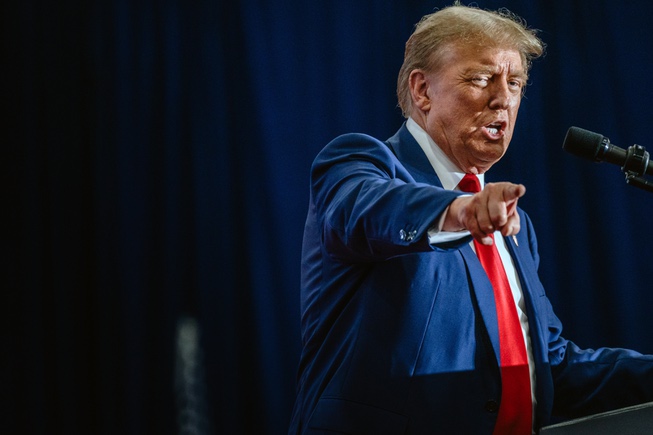
Jamie Kelter Davis / New York Times, file
Former President Donald Trump, the presumptive Republican nominee for president, campaigns in Green Bay, Wis., on April 2, 2024. The federal indictment of Donald Trump for plotting to overturn the 2020 election relies in part on the law that the Supreme Court weighed on Tuesday, April 16, 2024, but was built to survive without it.
Wednesday, April 17, 2024 | 2 a.m.
Even though Donald Trump was never mentioned during the Supreme Court’s hearing Tuesday about a federal obstruction statute used against hundreds of his supporters who stormed the Capitol on Jan. 6, 2021, the former president loomed large over the proceeding.
That is because Trump has been charged under the law in question in an indictment he is facing in Washington that accuses him of plotting to overturn the 2020 election. And the court’s eventual decision on the obstruction law could affect how his case moves forward.
It remains unclear at this point how the court will rule, but at the hearing the justices signaled that federal prosecutors may have interpreted the law too broadly and used it unfairly against many of the rioters who were on the ground Jan. 6. But even if the court tosses out the use of the law against Trump supporters who broke into the Capitol, it does not mean that the course of Trump’s own case will be greatly altered.
Lawyers representing hundreds of Jan. 6 defendants have been questioning the use of the obstruction statute since long before Trump was charged with it in August. The lawyers have claimed, among other things, that one of the law’s central provisions, requiring the government to offer some proof that documents were destroyed or tampered with, has nothing to do with breaking into the Capitol.
If the Supreme Court ends up agreeing with them, Trump’s own lawyers will surely seek to have the two obstruction counts he is facing stricken from his indictment.
One of those counts accuses him of conspiring with six others who are unidentified — widely thought to be a group of lawyers close to him — to disrupt the certification of the election that took place inside the Capitol during a joint session of Congress on Jan. 6. The second count accuses him of actually obstructing that proceeding.
In fact, Trump’s lawyers have tried to have those charges thrown out. In October, they argued unsuccessfully to the trial judge in the case, Tanya Chutkan, that the indictment unfairly used the statute. The lawyers pointed out that the law was initially “directed at the destruction of records in accounting fraud,” but had been applied in Trump’s case “to disputing the outcome of a presidential election.”
“This stretches the statutory language beyond any plausible mooring to its text,” the lawyers wrote.
Jack Smith, the special counsel handling Trump’s case, has asserted that the two obstruction counts against the former president would survive even if the justices narrowed the law to cover only crimes that involved tampering with documents or records.
Trump triggered that provision of the law, Smith has said, by plotting to create a series of false records: slates of electors pledged to him in several key swing states that he actually lost to President Joe Biden. Smith has accused Trump of seeking to use those fake slates to obstruct the certification proceeding by throwing it into chaos and by urging his vice president, Mike Pence, to capitalize on the confusion by blocking or delaying the formal declaration of Biden’s victory and opening a path to Trump’s being named the winner.
But even if the obstruction counts were ultimately dismissed from Trump’s indictment, it might not prove to be a fatal blow to the prosecution.
Smith has also brought against Trump two more conspiracy charges that overlap almost entirely with the accusations in the obstruction counts. The other conspiracy counts accuse him of committing fraud by using deceit to subvert the normal course of the election and with plotting to deprive millions of Americans of the right to have their votes properly counted.
Those counts add a layer of redundancy to the indictment, which could survive intact even without the obstruction counts. There would be one downside, from the government’s perspective, to losing the obstruction charges: each carries a hefty maximum sentence of 20 years in prison.
The fraud conspiracy Trump is facing has a maximum penalty of five years in prison and voting rights conspiracy caps out at 10 years.
Any Supreme Court ruling that found in favor of the on-the-ground Jan. 6 defendants would not automatically strip the obstruction charges from Trump’s indictment. To get rid of those counts, he and his lawyers would have to first ask Chutkan to do it. Depending on the details of the decision by the justices, she might deny Trump’s request.
But if the obstruction counts were in fact stricken from the case, it could, in theory, narrow the story that Smith would like to tell the jury — if and when the case goes to trial.
Smith has indicated that he wants to show the jury videos of the violence at the Capitol and perhaps introduce witnesses who will testify that they stormed the building believing they were acting on behalf of Trump.
But that could be more difficult without the obstruction counts given that those charges arguably offer the clearest legal path to introducing evidence about the riot at the Capitol itself. If Smith wanted to introduce that evidence without the obstruction counts, he would have to base his request on the remaining conspiracy charges, which may prove more challenging.
This article originally appeared in The New York Times.
